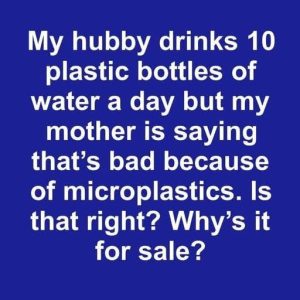In recent years, the topic of microplastics has gained significant attention, particularly concerning their presence in bottled water. With growing awareness about environmental and health issues, many people are questioning the safety of consuming water from plastic bottles. This article explores the concerns surrounding microplastics, particularly in the context of a common scenario where someone drinks multiple bottles of water daily. We’ll delve into why microplastics are a concern, the reasons bottled water remains popular, and what alternatives exist.
The Rise of Bottled Water Consumption
Bottled water has become a staple in many households due to its convenience, perceived purity, and accessibility. Over the past few decades, the bottled water industry has seen exponential growth, driven by marketing campaigns that emphasize the health benefits and safety of bottled water compared to tap water. This surge in consumption has led to increased scrutiny over the environmental and health impacts of plastic bottles.
What Are Microplastics?
Microplastics are tiny plastic particles, typically less than 5 millimeters in size, that result from the breakdown of larger plastic debris. They are pervasive in the environment, found in oceans, rivers, soil, and even the air. Microplastics can originate from various sources, including the degradation of plastic waste, microbeads in personal care products, and synthetic fibers from clothing. In the context of bottled water, microplastics can leach into the water from the plastic bottles themselves.
What Happens to Your Body When You Eat Garlic on an Empty Stomach
Read More
What Happens to Your Body When You Eat Garlic on an Empty Stomach
Health Implications of Microplastics
The potential health effects of microplastics are a growing area of research. While the full impact on human health is not yet fully understood, some studies suggest that microplastics could carry harmful chemicals or pathogens, potentially leading to health issues if ingested in large quantities over time. Concerns have been raised about their ability to cause inflammation, disrupt endocrine functions, or accumulate in organs. However, more research is needed to draw definitive conclusions.
Environmental Impact of Plastic Bottles
The environmental impact of plastic bottles is significant, contributing to pollution and waste. Plastic bottles are often not recycled properly, leading to accumulation in landfills and oceans. This not only harms wildlife but also contributes to the proliferation of microplastics in the environment. The production and transportation of bottled water also have a considerable carbon footprint, further exacerbating environmental concerns.
Why Is Bottled Water Still on the Market?
Despite the concerns, bottled water remains widely available due to its convenience, marketing, and the perception of safety. Many consumers believe bottled water is cleaner or safer than tap water, particularly in areas where water quality is questionable. Additionally, the bottled water industry is a lucrative market with significant economic interests, which helps maintain its presence on store shelves.
Alternatives to Bottled Water
For those concerned about microplastics and environmental impact, there are several alternatives to bottled water. Using a reusable water bottle and filling it with filtered tap water is a sustainable option. Home water filtration systems can improve tap water quality, providing a safe and eco-friendly alternative. Public awareness and infrastructure improvements can also enhance trust in tap water, reducing reliance on bottled water.
Expert Opinions on Microplastics and Health
Experts in environmental science and public health are actively studying the effects of microplastics. While there is consensus that microplastics are widespread and potentially harmful to the environment, the direct impact on human health remains a topic of ongoing research. Scientists advocate for more comprehensive studies to understand the long-term effects and call for measures to reduce plastic pollution.
Making Informed Choices
While the presence of microplastics in bottled water is a valid concern, making informed choices can mitigate potential risks. By understanding the implications of plastic consumption and exploring alternatives, individuals can make decisions that align with their health and environmental values. Awareness and education are key to addressing the challenges posed by microplastics and reducing reliance on single-use plastics.

